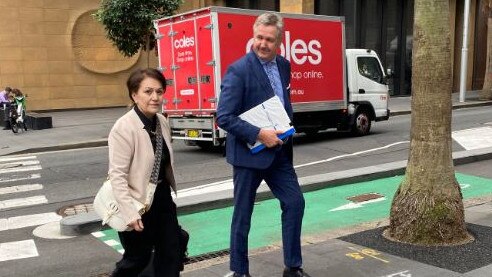Court told outgoing Oil Search CFO didn’t know he was to be replaced
Oil and gas executive Stephen Gardiner didn’t know he was being removed as Oil Search CFO before Ayten Saridas was appointed, the NSW Supreme Court has heard.

Explosive claims that former executive Stephen Gardiner did not know Oil Search was looking for a new chief financial officer before Ayten Saridas was poached and appointed to take his place have been made in court.
On day six of a trial brought by Ms Saridas, who says she was forced to leave Oil Search after just four months because she was bullied by former CEO Keiran Wulff and Mr Gardiner, allegations were lobbed that the company also ignored her concerns about high gearing ratios in 2020 and that perhaps there was “not enough equity raised”.
Ms Saridas held firm under cross-examination from Jeremy Clarke, SC, who suggested she might want to reflect on her memory and accept it was possible she was mistaken about a conversation that took place between herself and Mr Wulff in 2020 before she was formally employed as CFO-designate that year in August.
“You say Mr Wulff said to you Mr Gardiner was not aware Oil Search was looking for a new CFO. I want to suggest you might be mistaken,” Mr Clarke said.
Ms Saridas rebutted almost all of Mr Clarke’s accusations that she was wrong.
The court heard Mr Wulff has denied those claims and that Mr Gardiner had previously indicated he wished to step down, and actively participated in a recruitment process for a deputy CFO in 2019. “I was made aware this conversation had to be kept confidential because the CFO was not aware of the meeting,” she said.
Ms Saridas agreed she was “absolutely adamant” the gist of the conversation between herself and Mr Wulff was that her appointment had to be kept secret, and said she was confident that was the case because Oil Search’s general counsel Mike Drew also asked her to keep it confidential.
Mr Drew has also denied the claims made by Ms Saridas.
Oil Search breached a number of its market disclosure obligations including that it declined to announce Mr Gardiner was due to step down as CFO by February 2021, Ms Saridas said.
She also told the court she had the benefit of more than 30 years experience working for ASX-listed companies. “I have worked in enough corporations to know what is expected by shareholders. They want to know when people in (executive) positions are about to leave. This is about making sure the market is fully informed in a timely manner,” she said.
“There were other disclosures more serious than this. The combination of the lot made me very concerned about the governance of the company.”
Before Ms Saridas formally started work with Oil Search, she said she was across its financial position based on publicly available annual reports and ASX announcements.
She acknowledged the company had also stated in a market announcement it had sufficient liquidity through to the end of 2021, but Ms Saridas challenged that claim.
After she observed a board meeting in July 2020 when she received internal copies of documents, she said she spoke with Mr Drew.
“I do recall other graphs shown … other than these (papers) that the gearing was extremely high and based on internal forecasts that there was no room for error,” she said.
“That perhaps not enough equity was raised and without additional equity those covenants were likely to be breached. Effectively I was concerned about the gearing ratios,” the court heard.
As well, she said she understood her employment with the company was being accelerated amid concerns about funding and that she needed to imminently develop a capital management plan because the company had not started refinancing.
“I would have expected a company that has just raised $US700m … I would not expect in less than 12 months time they would run out of money again,” she said. She further denied Mr Clarke’s assertions she was trying to “shake up” the company and “turn it on its head”.
The matter has been adjourned until June, when Ms Saridas will continue to be cross- examined.







